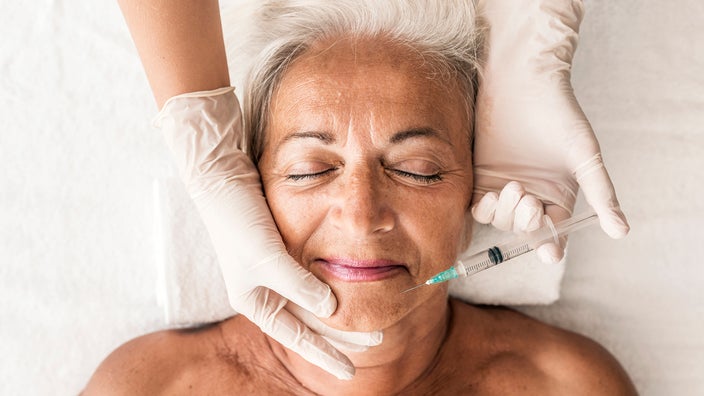The aging process causes physical changes in the body that many older adults have difficulty accepting. Age-related changes such as decrease in vision, loss of hearing, and loss of elasticity in the skin occur overtime. Furthermore, it may become difficult for older adults to sleep, ambulate, or maintain adequate hydration (Touhy & Jett, 2020). As people age they have an increased chance of developing chronic conditions that affect their overall health. While some may look at these changes in a positive way, others may have feelings of fear and denial. Therefore, they may look for a product or treatment that can avoid these physiological changes.
Botox injections is a procedure used to
reduce the amount of wrinkles in the face. This can be appealing to older
adults who want to have a younger appearance. People can determine the validity
of claims of Botox injections by researching its effectiveness at reducing wrinkles.
Botox injections have become a common cosmetic procedure with almost three
million injections being administered per year (Witmanowski & Błochowiak,
2020). Millions of people have had successful results and find it safe and
effective. However, there are side effects such as bruising that can last for
weeks to months, which is why doctors ask patients to stop medications like
aspirin beforehand (Saroya et al., 2021). Older adults should especially be
careful because they may be taking medications like Eliquis to treat health
conditions such as atrial fibrillation. Other side effects include pain,
swelling, and drooping of the eyelids.
A consumer would find out these things by
researching the procedure or asking people that they know who have had it done.
Detailed articles and websites that end in .edu or .org can provide valuable
information that is reliable. The persuasive influence of testimonials is used
by people who have gotten Botox injections and are able to give others a review
on the procedure. There may be patients that had a great experience and did not
have any side effects. However, the Botox injections may not have worked for
other individuals, or they suffered from major side effects. The research and science
explains how the procedure works and the different aspects involved with receiving
it. It elaborates on the mechanism of action, the specific facial muscles it
targets, and the potential side effects. A person can differentiate testimonials
from research by understanding that a testimonial is based off of someone’s opinion
which is biased, and research is based off of science which is factual.
Botox injections are subjected to regulations in the United States. Since, it is a prescription medication it can only be administered by a healthcare professional (Aesthetics & Medical Blog, n.d.). Therefore, practitioners need to have a license before performing the procedure or else they will be in violation of the law. I do support older adults who decide to receive Botox injections. The procedure has been approved by the U.S. Food and Drug Administration (FDA) since 2002 and is considered safe and effective at reducing wrinkles (Cheng, 2007). It can improve a person’s quality of life and help them feel confident as they continue to grow older. The nurse should address the patient’s emotional response to getting Botox injections by promoting the health of the skin. Older adults face many age-related changes in the skin such as decrease in thickness, loss of stretch and elasticity, and decrease of sebum production (Touhy & Jett, 2020). Therefore, when receiving the procedure, the nurse should educate the patient on side effects to look for because older adults are more at risk due to how delicate their skin is. Also, they should understand how to perform regular examinations on their skin. Many older adults will have a positive emotional response to getting Botox injections because their appearance has changed to help them look younger. The nurse can validate their feelings and encourage them to take care of the skin properly.
References
Aesthetics & Medical Blog. (n.d.). What are the botox® laws by state?. Empire Medical Training. https://www.empiremedicaltraining.com/blog/what-are-the-botox-laws-by-state/
Cheng, C. M. (2007, March). Cosmetic use of botulinum toxin type A in the elderly. National Center for Biotechnology Information. https://www.ncbi.nlm.nih.gov/pmc/articles/PMC2684082/
Fischer, K. & Aungst, C. (2022, May 20). How Much Does Botox Cost?. GoodRx Health. https://www.goodrx.com/botox/how-much-does-botox-cost
Sadati, K. (2019, August 12). Dr. Sadati transforms 71 year old woman with lower face and neck lift and restylane lyft filler [Video]. YouTube. https://www.youtube.com/watch?v=9vnvdX8_WOQ
Saroya, K. K., Singh, K., Sethi, N., & Kaur, S. (2021). Botox- the wonder poisonous healer. Journal of Dental Specialities, 9(2), 57–62. https://doi.org/10.18231/j.jds.2021.015
Touhy, T.A., & Jett, K. (2020). Ebersole & hess’ toward healthy aging: Human needs & nursing response (10th ed.). Elsevier.
Witmanowski, H., & Błochowiak, K.
(2020). The whole truth about botulinum toxin - a review. Advances in
Dermatology & Allergology / Postepy Dermatologii i Alergologii, 37(6),
853–8611. https://doi.org/10.5114/ada.2019.82795


No comments:
Post a Comment